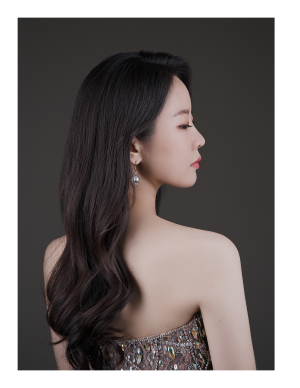Offering a glimpse into what the Paderewski Piano Festival has in store for November, pianist Young Sun Choi brought the works of Schumann, Debussy, Carl Vine, Chopin, and, of course, Paderewski to the North Carolina Museum of Art in Raleigh. Held in the NCMA’s SECU Auditorium, Choi’s performance marked the beginning of the Tenth Annual Paderewski Festival, which will also be a celebration of the 100th anniversary of Paderewski’s second appearance in Raleigh on November 23, 1923. Choi began the program with four selections from Paderewski’s Op. 14 Humoresques: the famous Minuet, Sarabande, Burlesque, and Caprice a la Scarlatti.
From the first note, I was drawn in by Choi’s technique, always keeping her wrists low to the keyboard and creating a perfectly rounded tone, which is hard to do so consistently throughout an entire two-hour performance. The Baroque-inspired Paderewski selections allowed Choi to showcase her voicing abilities, but this was also true of Vine’s Sonata No. 1, published about a hundred years later. The melodic responsibilities were passed between different hands and fingers in both pieces, but her attention to detail was especially effective in the Vine sonata. Choi took extra care to guide the ear of the listener to the important elements of the music, which is often forgotten in performances of contemporary music. The Vine sonata was a huge technical undertaking, but Choi’s meticulous approach prevented the piece from simply becoming a novelty or random sound for the sake of shock value.
It was also easy to see Choi’s unbridled joy while performing, and it immediately became clear that she had the entire room in the palm of her hand. Whenever the music was brought down to a whisper, like in Schumann’s Sonata No. 1, you could feel the audience listening even closer, making the climaxes that followed far more powerful. Her ability to create atmosphere is unmatched, which was most apparent in Debussy’s “Reflets dans l’eau” (“Reflections in the Water”) from book one of Images. The rounded tone mentioned earlier suited this piece perfectly, bringing out the translucent nature of the music. It also created an interesting effect where I could not discern the beginnings of notes. They just hung in the air, becoming part of the natural noise of the room, which works well in the music of a composer like Debussy. The program was intentionally bookended by Polish composers, beginning with the Paderewski selections and ending with Chopin’s Op. 49 Fantasy in F Minor. The final piece was a culmination of everything that came before it, allowing Choi to create an intimate atmosphere while still handling the technical challenges presented in the music – two elements found in every Chopin work.
There is a constant energy below the surface of Choi’s playing that is undeniable. It always seems as if she is balancing on the line between calm and excitement. The longer she held the music on the edge of either side, the more satisfying it became when it finally tipped over. To be able to do this in every piece of a program of this scale is immensely impressive, and you could not have asked for a better start to this year’s Paderewski Festival.
The 2023 Paderewski Piano Festival will continue later this year, with performances on November 4th, 5th, 11th, and 12th.











